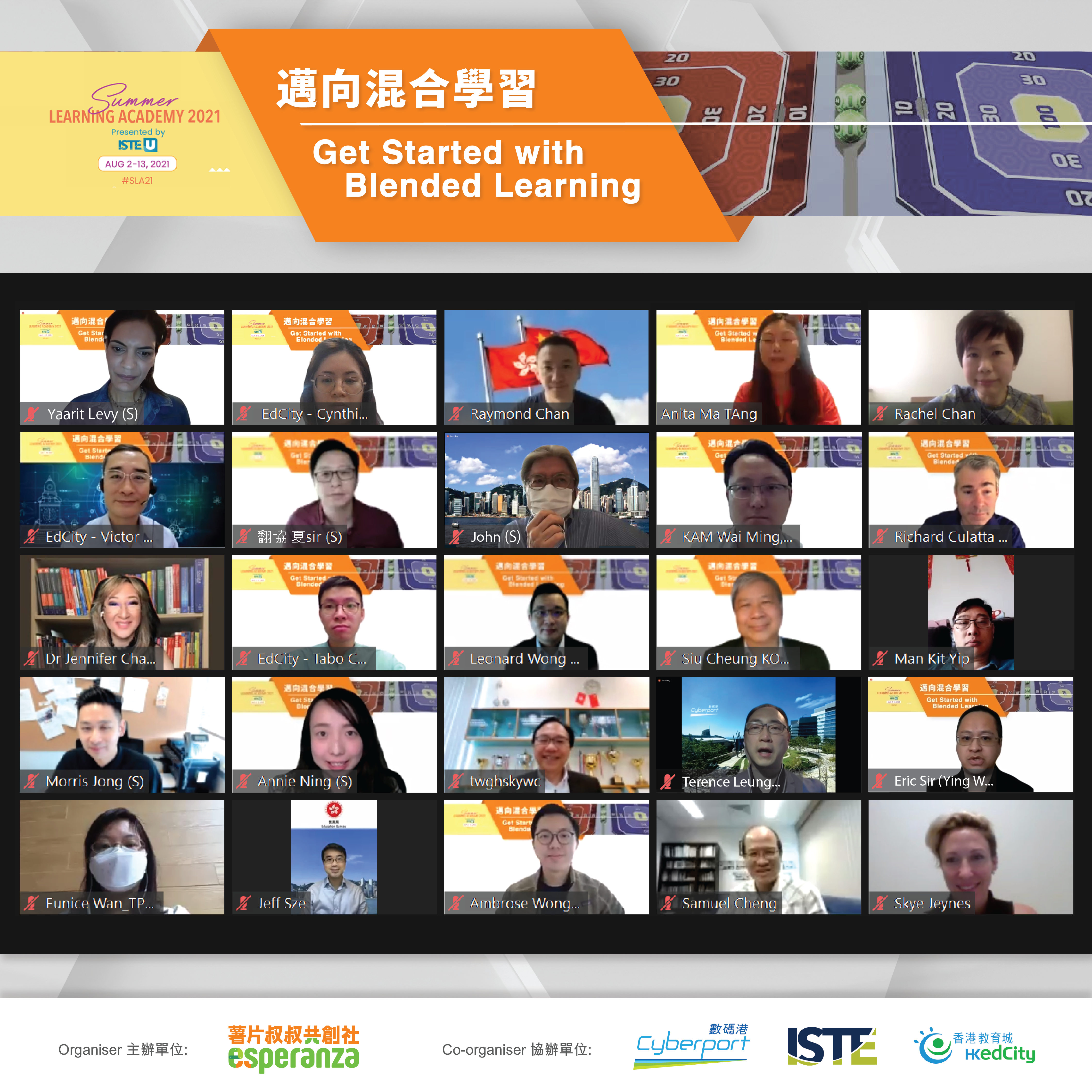
“Professional development of teachers should be of utmost priority in any blended learning development strategy”. This was the key message resonating with speakers at the “Get Started with Blended Learning” webinar on 24 April. The 220 educators attending the webinar were eager to learn how schools could learn from the remote learning experience during the pandemic and migrate to blended learning when schools resume face-to-face teaching.
Blended Learning
Richard Culatta, CEO of International Society for Technology in Education (ISTE), shared the four major modes of blended learning:
- station-rotation model with one group of students having teacher-led instruction, one group having online instruction and another group doing collaborative activities
- group projects with the teacher
- Central Learning Lab with the teacher assigning students to different learning methods based on their unique needs
- Face-to-face teaching supplemented by experts from around the world
In implementing blended learning, Culatta highlighted the importance of human interactions. We should avoid two pitfalls:
- Not giving enough focus on teachers
- Thinking buying software only
Culatta said the most powerful blended learning is to enable personalized learning. Students can create their own learning materials. Blended learning also allows formative assessment.
On getting started with blended learning, schools could begin with one class. There is no need for sophisticated technology. Mobile devices could do a lot.
On the issue of screen time, Culatta introduced his new book “Digital for Good”. He explained that ‘balance’ is most important. The problem lies not with screen time but the value of the screen time.
Annie Ning, Asia Affairs Director of ISTE, introduced the collaboration between ISTE and Esperanza to build the capacity of educators in Hong Kong. The training programme will enable educators to attend amongst other things:
- ISTELive21, the virtual ISTE annual conference (26 – 30 June)
- the Summer Learning Academy (2-13 Aug) with 3 micro-courses and 6 webinars to help educators:
- Identify and understand challenges faced by students and achievement gaps that were widened during distance learning.
- Develop strategies for using technology to support and empower students, especially those with special needs.
- Leverage student data to better understand and meet the needs of students.
- Develop strategies to form meaningful connections with students and families
- Identify communication and instructional strategies that address students’ social and emotional learning and well-being.
- Leverage technology to allow students to connect with each other and global resources.
- Expand their role as teachers to support flexible learning scenarios.
- Develop students as engaged, curious learners who take an active role in their learning.
- Design lessons that make space for student autonomy and interest-driven projects.
- Creative Constructor Lab (15-17 Oct) to learn with educators from around the world how to create vibrant learning environments using digital storytelling, design thinking, coding etc
- One year of ISTE membership to access the online resources and the global professional learning network
Selected participants would also have the opportunity to receive a scholarship to go through the ISTE certification for teachers, be featured on EdSurge and be invited to speak at the ISTE Annual Conference in June 2022.
Rachel Chan, Co-Founder of Esperanza, said only 20 school places are available, with 3 representatives from each school. Interested schools were encouraged to apply early on or before 31 May 2021.
Picking on Culatta’s key messages, John Tsang, Founder of Esperanza, underscored the importance of professional development for teachers to allow educators to migrate to blended learning successfully. A dedicated fund should be set up for this purpose. Jeff Sze, Political Assistant to Secretary for Education, said the government would continue to invest in the development of e-learning in Hong Kong. It is a priority in the Chief Executive’s last policy address. He highlighted the importance of setting the goals and the development directions.
Learning Coding, STEM and 21st Century Skills through CoderZ League
Rachel Chan introduced the virtual coding and STEM learning platform of CoderZ, an award winning startup from Israel and one of the winners of the Edventures GBA Fellowship organized by Esperanza and Cyberport. Through the partnership with Esperanza, CoderZ is offering a special introductory offer to Hong Kong schools whereby each license will enable a school to:
- Enroll for all the CoderZ courses for students at different levels
- Join all the 3 divisions of the CoderZ League, a virtual international robotics tournament
Mentorship from coding professionals in Hong Kong will also be arranged for schools with the school license. The 3 winning teams will be invited to attend the Big Idea Tech Camp in Israel in Summer 2022 and offered job shadowing opportunities with technology companies based in Hong Kong.
Yaarit Levy of CoderZ said over 500,000 students from around the world have used their platform. Students learn not just programming, but also Maths, Physics, Engineering and other STEM concepts. Over 150,000 students from 18 countries have also joined the CoderZ League, which enhances students’ learning motivation and builds important 21st century soft skills. Apart from the 3 Hong Kong champions, there will be other awards to incentivize students such as inspiration, creativity, contribution and motivation awards. Leonard Wong (SKH Kei Yan Primary School) and Eric Chan (Ying Wah College) shared their experiences with CoderZ. They highlighted the following features:
- Enable all students to learn anytime anywhere under the new normal
- No need for hardware acquisition
- Different modules to cater to different students, mainly using Blockly programming
- Good way for students to learn Mathematics
- Train students’ logical thinking, analytical and planning skills
- Ample resources to support teachers and to track students’ progress
- Can be easily translated into Chinese
Blended Learning Support to Schools
Ambrose Wong, Policy Researcher at MWYO, moderated the panel with:
- Professor Siu Cheung Kong, the Education University of Hong Kong
- Prof Morris Jong, Director, Centre for Learning Sciences and Technologies (CLST), the Chinese University of Hong Kong
- Terence Leung, EdTech Cluster, Esports and Youth Team Lead Cyberport
- Stanley Wai Ming Kam, Chairman of The Hong Kong Association for Computer Education (HKACE)
- Henry Ha, Chairman, FlippEducators@HK
Professor Kong stressed that the ultimate goal of blended learning is to increase the efficiency and efficacy of teaching. He talked about the need for pedagogical design and infrastructure reviews for blending physical and virtual teaching and learning. We need to provide more professional training on blended learning. The Education University hosted many webinars with over one thousand participants in the past six months. He realized that the demand for video streaming platforms and data analyses has greatly increased. The university is now developing a video portal for the public. He also suggested the development of multi-location teaching through the Sister School Scheme.
Prof Jong said the CLST facilitates the study and advancement of the theory and practice of learning sciences and learning technologies, disseminates research findings to the educational community, and promotes the effective use of learning technologies. The Centre runs a Master program on Learning Sciences and Technologies. Major foci of CLST include teacher professional development, educational gamification, flipped classroom, mobile learning, VR+AR in education and STEM/AI education. A key area of CLST work is to integrate social service education with STEM education. CLST works with EDB to provide educators with different training courses, supported by a YouTube Channel.
Terence Leung said there are some 130 EdTech companies at Cyberport providing solutions in:
- Educational Equipment
- Learning Environment Systems
- Gamed-based and Immersive Learning Solutions
- eLearning Technology and Solutions
- Smart Campus Solutions
Leung encouraged more exchanges and collaborations between schools and the edtech ventures. Contacts of the companies were shared with the webinar participants. Schools are welcomed to contact Cyberport too.
Stanley Kam introduced the work of The Hong Kong Association for Computer Education (HKACE) in promoting e-learning, coding, STEM and AI education. They organized awards such as IT Challenge Award, Young IT Ambassador Award, Cisco Innovation Challenge, and International Coding Elite Challenge. HKACE also works with major technology companies and edtech ventures to provide blended learning resources and training for teachers.
Henry Ha talked about the pros and cons of online and face-to-face learning. He highlighted the need to integrate the best of both formats to maximise the learning impact. One-way learning could be moved online, whilst face-to-face teaching should focus on interactive learning such as group discussions, homework support, problem exploration and solving.
